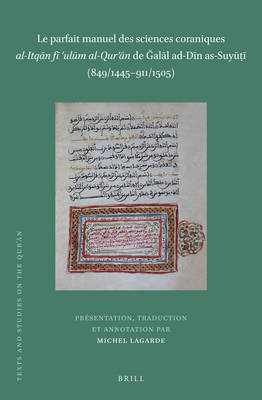
- Afhalen na 1 uur in een winkel met voorraad
- Gratis thuislevering in België vanaf € 30
- Ruim aanbod met 7 miljoen producten
- Afhalen na 1 uur in een winkel met voorraad
- Gratis thuislevering in België vanaf € 30
- Ruim aanbod met 7 miljoen producten
Zoeken
Le Parfait Manuel Des Sciences Coraniques Al-Itqān Fī ʿulūm Al-Qurʾān de Ğalāl Ad-Dīn As-Suyūṭī (849/1445-911/1505) (2 Vols)
Michel Lagarde
€ 402,95
+ 805 punten
Omschrijving
Dans Le parfait manuel des sciences coraniques al-Itqān fī ʿulūm al-Qurʾān de Ğalāl ad-Dīn as-Suyūṭī (849/1445-911/1505), nous avons une description complète des problèmes relatifs au texte coranique qui se posent encore aujourd'hui, des solutions proposées et des méthodes employées. Ce texte témoigne de la liberté du débat et de la variété des solutions. Il s'agit d'un recueil de témoignages multiples antérieurs et contemporains à l'auteur et non d'une opinion subjective et isolée. Son but est d'être le guide de tout bon commentateur du Coran, en raison de la profusion des informations fournies sur l'ensemble des sciences coraniques. Cet ouvrage est un précieux point de repère pour l'histoire de la culture arabo-musulmane, en général, et de la linguistique, en particulier.
In al-Suyūṭī's (1445-1515) The Perfect Handbook of the Qurʾānic Sciences, we find a complete description of the problems concerning the Qurʾānic text that still arise today, of the solutions proposed and the methods employed. This text bears witness to both freedom of debate and the variety of solutions. It is a collection of multiple accounts, both prior to and contemporary with the author, and not simply an isolated, subjective opinion. Its aim is to be the guide for every good Qurʾān commentator because of the abundant information it provides on all the Qurʾānic sciences. This work is an invaluable point of reference for the history of the Arab-Islamic culture in general and of linguistics in particular.
In al-Suyūṭī's (1445-1515) The Perfect Handbook of the Qurʾānic Sciences, we find a complete description of the problems concerning the Qurʾānic text that still arise today, of the solutions proposed and the methods employed. This text bears witness to both freedom of debate and the variety of solutions. It is a collection of multiple accounts, both prior to and contemporary with the author, and not simply an isolated, subjective opinion. Its aim is to be the guide for every good Qurʾān commentator because of the abundant information it provides on all the Qurʾānic sciences. This work is an invaluable point of reference for the history of the Arab-Islamic culture in general and of linguistics in particular.
Specificaties
Betrokkenen
- Auteur(s):
- Uitgeverij:
Inhoud
- Aantal bladzijden:
- 1460
- Taal:
- Engels
- Reeks:
- Reeksnummer:
- nr. 13
Eigenschappen
- Productcode (EAN):
- 9789004357099
- Verschijningsdatum:
- 9/11/2017
- Uitvoering:
- Hardcover
- Formaat:
- Genaaid
- Afmetingen:
- 170 mm x 241 mm
- Gewicht:
- 2562 g

Alleen bij Standaard Boekhandel
+ 805 punten op je klantenkaart van Standaard Boekhandel
Beoordelingen
We publiceren alleen reviews die voldoen aan de voorwaarden voor reviews. Bekijk onze voorwaarden voor reviews.








